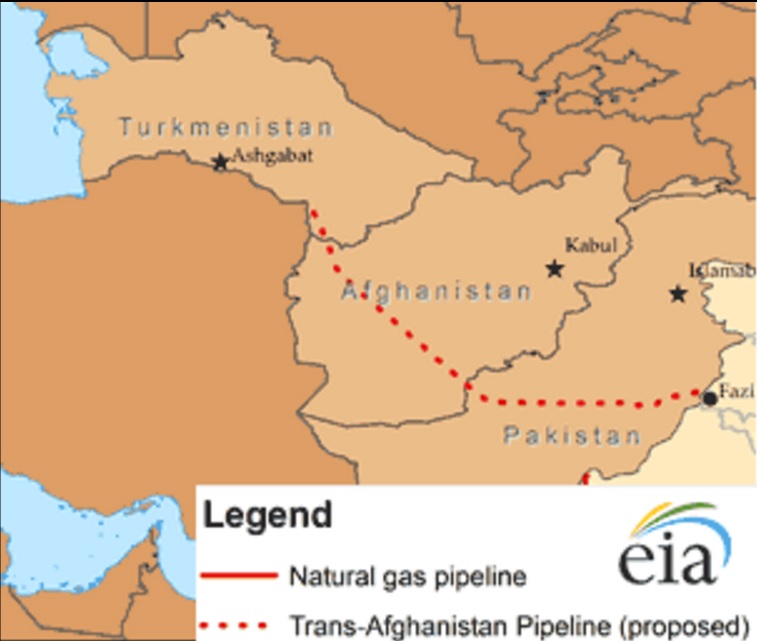Afghanistan’s Pipeline Project to Peace and Prosperity?
Yamin Zakaria
December 19, 2015
London, UK
Call it political analysis or conspiracy theory, commercial interests often underpins foreign policy. Accordingly, many alleged that the US supported the Taliban regime through its ally Pakistan because it wanted to build a Gas pipeline in the 1990s along with the other strategic interests. The pipeline would run from the Central Asian countries through Afghanistan, avoiding Russia and Iran. It was a lucrative project; Turkmenistan holds the world’s fourth-largest natural gas reserves. There were two rival bids for the project, one from the US based company Unocal and the other was from Argentina. The Taliban-led regime went with the American company. Was it entirely a commercial decision or was there a political element the US that pushed the decision in that way.
While the debate of US-Taliban alliance continued, the situation changed drastically on the grounds with the bombing of US embassies in Nairobi and Dar-us-Salam in 1998, the 9/11 attacks and the presence of Al-Qaeda in Afghanistan. The US responded by attacking and the ousting the Taliban regime and the theory changed, now the US wants to build a gas pipeline without the Taliban, who had become an enemy.
The Taliban are no longer in power, and US presence is almost vanishing, and the project to resume the pipeline has begun, but the US is not involved. The leaders of four nations signed a pact to build a gas pipeline from the Central Asian country of Turkmenistan, through Afghanistan and Pakistan to India and it has been called the TAPI line, the initials representing each country. Given the size of the Chinese market, it is surprising that they have not been involved in TAPI project, as the gas could also be carried to China through India. Construction on the TAPI project started in Turkmenistan on 13 December 2015, and it is expected to be finished by December 2019. Everyone stands to gain from this.
Economic cooperation usually promotes peace and stability; neighbouring nations become business partners rather than remain bitter rivals with a potential for conflict. It has worked for Europe. The European Union has kept the peace since the end of Second World War, and economic progress has also complemented that progression. For this union of nations to congeal and grow, the member nations must have political stability within, and collectively share the same objective. Although the countries in TAPI share the common goal of making a profit, they are not all internally stable. The stability factor remains precarious for Afghanistan and to a lesser extent in Pakistan, especially with the Taliban insurgency that has gained momentum in recent times. How to neutralise the Taliban remains a fundamental obstacle for peace and the emerging ISIS (Islamic State of Iraq and Syria) cells could pose additional problems. Thus, Western giants such as Chevron, Exxon, BP and Total refrained from committing to this worthwhile project so far.
Is there a way to buy out the Taliban so that the pipelines would remain safe? The ransom could be too high for the Afghan regime. Alternatively, this could trigger the political process for the Taliban to integrate gradually, perhaps seeing the economic benefit and prosperity, in the long run, it could start to bring the moderate faction of the Taliban to join the political process and lay down their arms. The success of this pipeline project could also be a springboard for other joint ventures and promotion of a regional economic trading block. Maybe someone could explain to the Taliban that a nation’s military muscle is dependent on its economic muscle. No matter how much willpower you have, they are no match for the firepower of modern weapons. Have they not learnt anything from the US decimation of Al-Qaeda and the Taliban regime post 9/11?
If the project fails to deliver due to the insurgency in Afghanistan, the competing Pipeline from Iran through Pakistan and into India may gain priority. The US supports the TAPI project while opposing the Iran plan. Perhaps, if the Iranians gave further concession on their nuclear agenda, the US may begin to show greater support. Certainly, Iran does not have any internal insurgency and cost of transporting gas through Iran is also lower. According to Iranian officials, India dropped out of the $7 billion gas pipeline from Iran under US pressure. However, Pakistani officials have also said they were hopeful to revive the stalled project, which will also take the pipeline to China and Bangladesh through India. Iran has already completed the 900 km extension of the pipeline on its territory in 2013. The country’s ambassadors to Dhaka and Beijing have said Iran was also ready to talk extending the gas link to Bangladesh and China.

